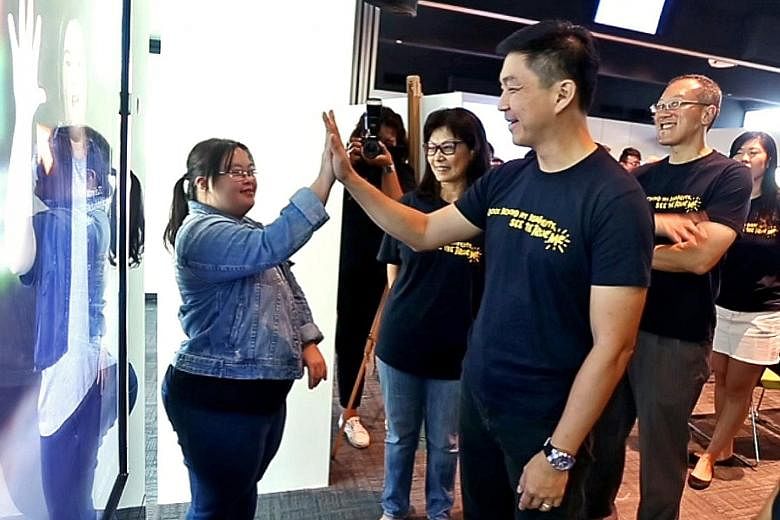Six in 10 people with disabilities do not feel that they are socially included, accepted or given opportunities to achieve their potential, a government survey has found.
Of the general public who were polled, only 3 per cent of respondents would be comfortable marrying someone with a disability, and just one-third are fine with being close friends with a person with disabilities.
People also view those with autism or intellectual impairments less favourably compared with persons with physical disabilities.
These are some of the findings from a series of surveys last year by the National Council of Social Service (NCSS) that polled a total of 3,500 people, including caregivers of those with disabilities.
Yesterday, the council launched a $5 million, five-year campaign to raise awareness of disability issues.
Survey findings have been used to shape the campaign, which includes talks and a website to provide guidance on how to interact with people with disabilities.
Minister for Social and Family Development Tan Chuan-Jin, who launched the "See The True Me" campaign yesterday, said Singapore has made much progress in building the infrastructure needed for people with disabilities to get around, but that is not enough.
-
Key findings
-
• 62 per cent of the 1,000 people with disabilities surveyed do not feel they are socially included, accepted or given opportunities to achieve their potential.
• 57 per cent of people with disabilities feel they have no control over their lives.
• People with disabilities feel the public sees their differences as limitations for which they need protection and different treatment.
• Only 3 per cent of the 1,400 members of the public polled would be comfortable marrying a person with a disability.
• Only 36 per cent would be comfortable with being close friends with a disabled person.
• People view those with autism or intellectual impairments less favourably compared with people with physical disabilities.
"Beyond the physical hardware and infrastructure, what is even more important is to raise awareness within the wider community of disability issues, and to nurture the right attitudes when interacting with persons with disabilities among us," he said.
Mr Tan cited how a visiting speaker, who was in Singapore to deliver the keynote speech at a disability event, shared his delight about going for a swimming lesson as the pools here are wheelchair-friendly. He had contracted polio when he was young and uses a wheelchair to get around.
However, he was later told that the coach was unable to teach him together with other students.
He also did not feel included as the other participants did not know how to engage him or felt awkward doing so.
Mr Sim Gim Guan, NCSS' chief executive, said its studies show that there seems to be a lack of understanding or awareness by the public about persons with disabilities, especially those with less visible impairments such as autism.
"The lack of understanding often results in the public hesitating to interact and support persons with disabilities or to overcompensate in helping them regardless of their desire to be helped or not. There is a need to moderate both approaches," he said.
On the one hand, for example, Mr Sim said he has heard about how some well-meaning relatives of a man with a visual impairment helped him to carry his things and insisted that he slow down his walking pace when he did not need such special treatment.
On the other hand, people such as Ms Chen Wanyi, 27, often felt left out in school. Ms Chen, who has Down syndrome, said she was bullied in the past.
She said things have improved now because her colleagues at the hotel she works in are friendly and protective of her.
Mr Andrew Soh, assistant director at Down Syndrome Association, said public attitudes are less favourable towards people with autism and intellectual impairments, compared with those with physical disabilities, because people fear what they cannot see.
"People can't tell how serious their disability is and don't know what to say or how to help them," he said.
The lack of acceptance is especially prevalent when it comes to employment.
More than a third of the public will not hire people with disabilities if they are employers.
Mr Ong Peng Kai, 24, who has cerebral palsy, felt this sentiment first-hand when he tried to find a job last year.
"I studied maths and economics at university so I sent out about 30 resumes to banks, investment and insurance companies but none of them got back to me," said Mr Ong, who was eventually hired by NCSS as an assistant manager.
The president of the Disabled People's Association, Mr Nicholas Aw, said the campaign should target the young more.
"Such educational campaigns will help but how much they can help is a question mark. Sometimes people are aware but they are just not walking the talk," he said.
"Mindsets are hard to change so we need to go into the schools and start with the young because they are more open and receptive."
Mr Ong agreed. He recalled numerous times when parents asked their children to keep quiet whenever they pointed at him and asked them about his condition.
"I don't blame the children because they are young but if the parents give up such opportunities to educate them, it becomes a vicious circle and children will adopt the same behaviour when they grow up and become parents," he said.


